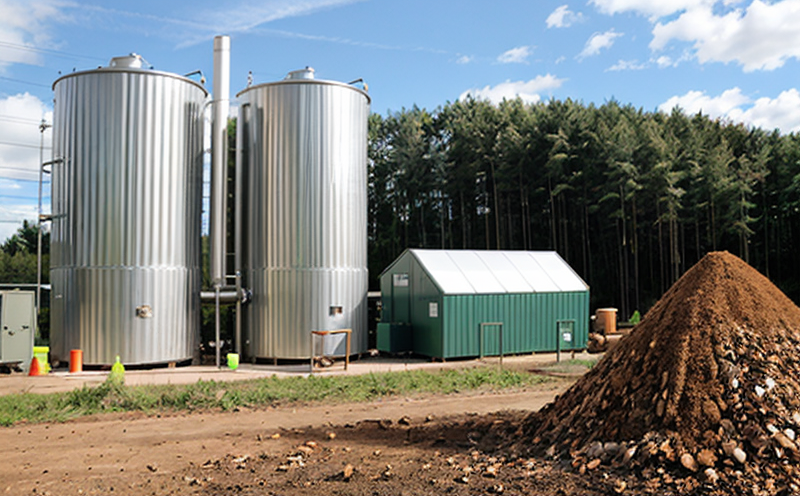EN 15402 Volatile Organic Compounds in Biomass Waste
The European standard EN 15402 specifies methods for determining volatile organic compounds (VOCs) in biomass waste. This testing is crucial as VOCs can significantly impact air quality, contribute to greenhouse gas emissions, and have potential health implications when released into the environment.
Biomass waste, often a byproduct of agricultural or industrial processes, contains various organic compounds that can volatilize under certain conditions. These compounds are not only hazardous but also offer valuable insights for optimizing waste-to-energy conversion processes. Accurate measurement and quantification of VOCs in biomass waste help ensure the efficiency and environmental compliance of waste management strategies.
The standard outlines precise methodologies to ensure consistent and reliable results across different testing facilities. It covers sample preparation, extraction techniques, analytical methods, and data interpretation. Compliance with EN 15402 ensures that stakeholders can make informed decisions regarding biomass waste utilization in energy conversion processes.
Understanding VOCs is particularly important for industries involved in waste-to-energy projects or those using biomass as a fuel source. The standard supports the development of effective waste management practices and contributes to sustainable resource utilization by providing accurate data on the composition of biomass waste.
The testing process involves several critical steps, starting with the collection and preservation of samples to prevent degradation or loss of volatile components. Samples are then prepared for extraction using appropriate solvents or other methods specified in the standard. Analysis typically employs gas chromatography (GC) coupled with mass spectrometry (GC-MS), which allows for precise identification and quantification of VOCs.
Accurate reporting is essential to ensure that all stakeholders, including regulatory bodies, can rely on the results for decision-making. Reporting should include detailed information about the sample characteristics, extraction conditions, analytical methods used, and any potential sources of error or variability in the data.
This standard plays a vital role in promoting sustainable waste management practices by providing robust methodologies to assess VOCs in biomass waste. By adhering to EN 15402, organizations can enhance their compliance with environmental regulations while also optimizing processes for energy recovery and resource conservation.
The importance of this testing cannot be overstated, especially given the growing emphasis on sustainable practices and the reduction of harmful emissions. Properly conducted tests under EN 15402 not only support regulatory compliance but also contribute to the broader goal of environmental protection and sustainability in waste management.
- Compliance with international standards
- Precision in VOC quantification
- Sustainability in resource utilization
- Emission reduction strategies
- Enhanced decision-making for stakeholders
Eurolab Advantages
At Eurolab, we pride ourselves on providing cutting-edge testing solutions that meet the highest standards of accuracy and reliability. Our expertise in waste management and recycling testing ensures that our clients receive comprehensive support throughout their projects.
We offer a range of services tailored to various industries, including detailed testing for volatile organic compounds (VOCs) in biomass waste as per EN 15402. Our state-of-the-art facilities are equipped with the latest analytical instruments and software, ensuring that our results are both precise and replicable.
Our team of highly qualified professionals is dedicated to providing personalized service and support. Whether you need assistance with sample preparation, data analysis, or interpretation, we have the expertise to ensure your project meets all necessary requirements.
We understand that every client has unique needs, which is why we offer flexible options for testing and reporting. Our commitment to quality and customer satisfaction sets us apart in the industry. With Eurolab, you can trust in our ability to deliver accurate and reliable results that align with your specific goals and objectives.
Partnering with Eurolab ensures not only compliance but also a competitive edge through informed decision-making based on robust scientific data. Our clients benefit from our extensive experience and industry knowledge, which contribute to successful outcomes in waste management and recycling projects.
Competitive Advantage and Market Impact
Compliance with EN 15402 is essential for organizations involved in waste-to-energy conversion and biomass testing. By adhering to this standard, businesses can demonstrate their commitment to environmental responsibility and regulatory compliance. This not only enhances corporate reputation but also opens up new market opportunities.
The ability to accurately measure VOCs in biomass waste provides valuable insights that can be leveraged for process optimization and emission reduction strategies. These insights are critical for improving the efficiency of energy conversion processes, thereby contributing to greater sustainability and cost-effectiveness.
Organizations that achieve compliance with EN 15402 gain a competitive advantage by setting higher standards within their industry. This can lead to increased trust from clients, investors, and regulatory bodies, ultimately driving business growth and success.
The market impact of adhering to this standard is significant. It fosters innovation in waste management practices and encourages the development of more sustainable solutions. By staying at the forefront of these advancements, companies position themselves as leaders in their field, attracting customers seeking environmentally conscious partners.
In summary, compliance with EN 15402 is not just a requirement; it's a strategic move that can positively influence both internal operations and external perceptions. It ensures that your business operates ethically while also contributing to global environmental goals.





